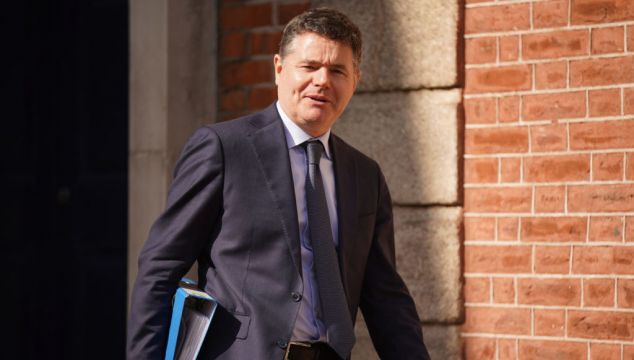The Government has forecasted inflation to peak at 6.75 per cent, however ministers have warned that pressure on oil and gas could push it up to 9 per cent.
The Minister for Finance Paschal Donohoe said that inflation is expected to average out at 6 per cent for the year, peaking at 6.7 per cent in the second quarter.
He said that elevated levels of energy and commodity prices are expected to feed through to higher levels of inflation.
However, Mr Donohoe warned that if energy prices increase at unexpected rates, inflation could peak at 9 per cent.
Ministers @Paschald & @mmcgrathtd, have today published the Government’s Stability Programme Update for 2022. This document sets out the Department of Finance macroeconomic and fiscal forecasts for the period 2022-2025. #SPU2022
Read more: https://t.co/7bJxwPofAZ pic.twitter.com/EoC7ibL1RIAdvertisement— Department of Finance (@IRLDeptFinance) April 13, 2022
Mr Donohoe said that the growth of the domestic economy has been revised down compared to forecasts prepared for Budget 2022, and is now projected to grow by 4.25 per cent this year and just under 4 per cent next year.
He said the economic fallout from the conflict in Ukraine is expected to slow, rather than derail the economic recovery.
The annual average unemployment rate is also expected to fall to 6.25 per cent for the year as a whole, closing the year at just over 5.5 per cent.
Publishing the government’s Stability Programme Update for 2022, Mr Donohoe said the government has recorded a deficit of more than €8 billion last year, with a further deficit of €2 billion projected for this year.
While next year, a modest surplus is projected, reflecting the unwinding of Covid-related expenditure.
“These economic and fiscal projections come at a time when the Irish economy is grappling with its third severe economic shock in as many years – Brexit, a global pandemic and now the fall-out from the war in Ukraine,” Mr Donohoe said.
“While Ireland’s direct exposure to the Russian economy is relatively small, it is clear that the conflict in Ukraine is already having a negative impact on the Irish economy, mainly via higher energy and commodity prices.
“On foot of these developments, my Department now expects inflation to peak at 6.75 per cent in the second quarter of this year before easing slightly over the rest of the year.
“Higher inflation will inevitably impact on the purchasing power of households.
“Uncertainty will also affect consumer spending and investment decisions.
“As a result, my Department is now projecting Modified Domestic Demand growth this year of 4¼ per cent – a 2¼ percentage point reduction relative to the Budget. Despite this, the headwinds we face today are expected to delay – but not derail – economic growth.
“Given the degree of uncertainty at present, the margin of error around these projections is sizeable.
“As such, we also set out an alternative severe scenario, where the increase in oil and gas prices is larger than assumed; under this scenario inflation would increase by an additional 2 percentage points to an annual average of 8.25 per cent, peaking at 9.25 per cent in the third quarter of this year.
“This would in turn have negative implications for the domestic economy and the government finances.
“We are projecting a budget deficit of €2 billion for this year.
“This would result in a cumulative deficit of almost €30 billion since 2020.
“For next year, after allowing for a contingency fund of €3 billion to help address the humanitarian consequences of the Ukraine conflict, we are expecting a small surplus of €1.2 billion.
“However, the modest surplus currently in prospect for next year would be eliminated if there was a greater than expected increase in energy prices.”
Minister for Public Expenditure Michael McGrath said: “Since the onset of the pandemic, Government has made available €37 billion to provide for direct expenditure measures to support our key public services in responding to the challenges of Covid-19 and to provide the necessary income and employment supports to our people and businesses.
“As we emerge from the pandemic, our economy and labour market are recovering with unemployment rate forecast to fall close to 5.5% by the end of the year.
“However, as the economy improves and we return our public finances to a sustainable path, we now face new challenges.
“Supply issues which developed over the past two years during the pandemic have contributed to price increases.
“This has been added to by the impact of the conflict in Ukraine and the resultant commodity price increases.”







